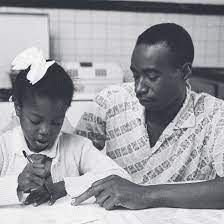In the tumultuous era of the Civil Rights Movement, many courageous individuals stepped forward, their stories etched in the annals of history. However, some heroes quietly weathered the storm, their sacrifices often overshadowed. One such unsung hero was Abon Bridges, father of Ruby Bridges, the first African American child to integrate an all-white school.
This blog post delves into the life and legacy of Abon Bridges, his family history, and the sacrifices he made for his children’s future.
Early Life Of Abon Bridges
Born on January 20, 1931, in Tylertown, Mississippi, Abon Bridges grew up in a time and place where opportunities for African Americans were severely limited. The discriminatory Jim Crow laws governed his early life, shaping his experiences and worldview. Despite these harsh conditions, Abon developed a strong work ethic, showcasing resilience and determination that would later define his legacy.
In 1956, Abon, along with his wife, Lucille, made the significant decision to move to New Orleans, Louisiana. They aspired to provide their four children, including the young Ruby Bridges, with better educational opportunities than they had experienced. This move marked the beginning of a tumultuous journey that would test the Bridges’ family strength and unity.
Abon Bridges’s Family History
Abon Bridges was the son of Ezell Bridges and Beatrice Cowart. He was deeply rooted in his family and community, drawing strength from these relationships to navigate the challenges that lay ahead. His marriage to Lucille Bridges, a strong and determined woman, would prove instrumental in shaping their children’s lives.
Together, they had four children, with Ruby being the youngest. Despite facing significant hardships, including job loss and eviction, the family stood their ground. Their decision to enroll Ruby in an all-white school, while controversial, was a testament to their belief in the power of education and equality.
Marriage to Lucille Bridges
Abon Bridges, a name not as widely recognized as his daughter, Ruby, but equally impactful. His life took a significant turn when he married Lucille Bridges. This union brought about not only a bond of love but also the roots of an influential family that would contribute significantly to the civil rights movement. Their marriage, founded on mutual respect and shared dreams, was the bedrock that nurtured their children into strong individuals who would stand up against racial segregation.
Children Ruby Bridges and Others
The marriage of Abon and Lucille Bridges resulted in the birth of eight children, including the renowned civil rights activist, Ruby Bridges. Abon’s legacy is often overshadowed by Ruby’s fame, but his influence on her life is undeniable. Ruby, the first African American child to desegregate an all-white school in the South, was a beacon of hope in the midst of the stormy civil rights era. Her courage was a direct result of the values instilled in her by Abon and Lucille.
Abon Bridges’s Life as a Sharecropper
Abon Bridges’s early life was marked by hardship and struggle. Born into a family of sharecroppers, he experienced the harsh realities of racial discrimination and economic exploitation. Despite these difficulties, Abon remained resilient, working tirelessly on the fields to provide for his family. His life as a sharecropper, although challenging, shaped his character, instilling in him a strong sense of dignity and determination that he passed on to his children.
Move of Abon Bridges to New Orleans
Seeking a better life, Abon Bridges made a daring move to New Orleans. This move was more than just a change of location; it was a leap of faith towards a brighter future for his family. In New Orleans, Abon found opportunities that were unimaginable in his previous life as a sharecropper. However, the move also presented new challenges, particularly when Ruby was selected to desegregate an all-white elementary school in the city.
Abon Bridges Supporting Ruby’s Integration
Abon Bridges played a crucial role in supporting Ruby’s integration into the all-white school. He stood firm against the tide of racial hostility, providing a strong pillar of support for his young daughter. Despite losing his job and facing numerous threats, Abon never faltered in his resolve. His unwavering support for Ruby’s integration reflects his courage and commitment to the cause of racial equality.
Influence of Abon Bridges
The influence of Abon Bridges extends beyond his immediate family. His story is a testament to the power of resilience, determination, and unwavering support for one’s family. Despite facing numerous adversities, Abon remained steadfast, embodying the spirit of resistance against racial inequality. His life serves as an inspiration, reminding us of the power of perseverance and the importance of standing up for what is right.
Death and Remembrance of Abon Bridges
Abon Bridges passed away at the age of 47 on February 22, 1978, in New Orleans, leaving a legacy of quiet strength and resilience. His life, though brief, was marked by significant milestones that impacted not only his family but also the course of American history.
Today, Abon’s legacy continues through his children and the countless lives touched by their actions. His daughter, Ruby Bridges, has since become a well-known civil rights activist. Her story, often recounted in books, films, and artworks, serves as a powerful reminder of the sacrifices made by numerous unsung heroes like Abon during the Civil Rights Movement.
Conclusion
Abon Bridges’ life serves as a compelling testament to the power of quiet resilience and unwavering determination. His role in supporting his children, particularly during Ruby’s integration into an all-white school, underscores the significant sacrifices made by countless African American families during the Civil Rights Movement. While his story may not be as widely known, his legacy lives on, reminding us of the enduring power of courage and conviction. The story of Abon Bridges, the unsung hero, is a tribute to all silent heroes who, like him, played a vital part in shaping the course of history.
You may also like:









